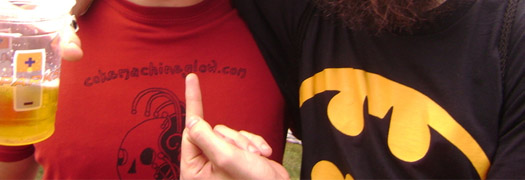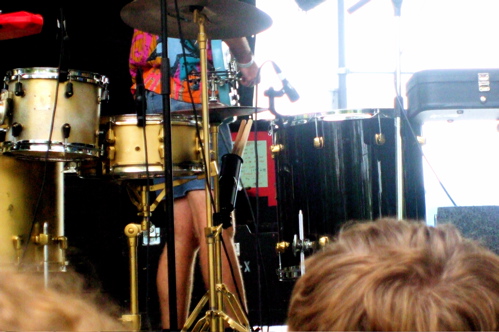
Features | Festivals
A Fundamental Reiteration of Everything Clay Posited Because I’m Moving to Portland and Can’t Formulate Many Original Thoughts
By Dom Sinacola | 4 August 2008
I’ll fundamentally reiterate everything Clay posited, but more importantly, through Clay’s account, I realized that at Pitchfork I had witnessed my seventh Spoon show. Which is alright enough, I guess—I’ve grown to appreciate Spoon’s sets through the logic they’ve created insularly (among us Spoonheads) and personally (over six nights and one afternoon); that Britt will wear black and that his hair will be fluffy but still somehow sharp, that they’ll bring out the horns when they do and play the worst songs off Gimme Fiction when they do, this is a Spoon-ness as defined by Spoon-in-motion: Spoon-ocity. Which is also why we left in the middle of the set and can still put a notch in the belt, because Spoon is just so relentlessly hinged to my very existence as a music critic that somehow Britt Daniel must represent my progression as a writer. Who must live every day with his failed ambitions and failing voice. In fact, the first Pitchfork review I ever read was Brent DiCrescenzo’s take on A Series of Sneaks. Spoon is the seamless wall of the past pressing into my evolutionary self. Spoon is the very picture of my entelechy.
For reals. As I’m leaving Chicago (knowing that Lollapalooza will probably squish me under its thumb or just lose me in the 75,000 capacity) the Pitchfork Music Festival appears more and more to have been a sad, fitting going-away. For seven formative years (oh, how the numbers parallel!) I treaded the same ground as Ryan Schreiber and listened to the same college radio station; his beef was mine, so they say, and then he told me who “they” were and so I started listening to rap music, I think. This was before he left, when I aspired to be like him, know like him, be seen as a knowledgeable crux of opinion like him because I was there, in the very locus of such opinion. When in Rome. No: Guyville, and also: Sigh. Goodbye, Pitchfork Headquarters! I’ll miss you, entrepreneurial authority figure! I’ll miss your dark windows reflecting the Cheetah Gym across the street where the Real World schmoes used to sleep! Godspeed!
My mimicry proved to be much less salient than assumed, because Schreiber ditched Chicago and Pitchfork Media became an all-encompassing entity; as prepubescent icon, primordial base for all future gonzo paradigms, they naturally had to grow as tastemakers, one city never enough to define the omni-radial mobility of spreading Pitchfork-ness. Like Clay might have said, they weren’t becoming indie tastemakers, they were solidifying the Pitchfork taste as an essential conceit within whatever it is that independent music has come to represent in an age where opinion and product are accessible simultaneously, easily. So, the idea that I had when I first came to Chicago—that I wanted to be an independent music critic like the Pitchfork critics—is still in effect, only the very idea of criticism of any independent music is now wholly qualified within the parameters of Pitchfork’s international breadth. Being a critic is not about supporting an opinion through carefully constructed prose, it’s about being attuned to the tides of Pitchfork standards, following how they shatter their own borders and pulse outward, trajectory and speed constantly altered within the boundaries of Pitchfork-ness: Pitchfork-ocity.
Was the 3rd annual Pitchfork Music Festival a going-away, then? Or a coming-to? Both, mostly: It probably all depends on whether you’re willing to accept Pitchfork as its current incarnation (media giant, career-maker for the underdogs) or you’re pining for Pitchfork 1.0 (music journalism sparkplug steeped in brilliantly-conceived contrariness), despite what proportion of the lineup you’d actually consider indie (as Clay proposed: all of it) and however you see eclecticism actually represented in the range of acts. Two things: A) Hip-hop was largely excised from the festivities, the exceptions summarily lumped into three high-profile acts, canonizing hip-hop as a genre within Pitchfork-ness while exploiting the profiles established; and B) Chicago became just a place—a nice, big place, sure—but even when talks and preview shows and movies were offered in the weeks leading up to the festival at places throughout Chicago like the Gene Siskel Film Center and the Empty Bottle or the Hideout or Schuba’s or, in the case of those formidably sitting Fleet Foxes, Grant Park (where Lollapalooza will soon take a whopping shit of consumerism), the city never became an attitude to be communicated through the Pitchfork Music Festival (very few local acts were actually featured), just a good, central place to set up on, governmental relationships already forged and politics mostly settled.
A going-away means that Pitchfork is, in essence, negating what it once was. It’s like all those cut-off jean shorts all over Union Park: on most legs (skinny and bleach-white) they negate the very spirit of jean-ness, frayed jalopy edges and all. Only on the thick thighs of the Ruby Suns’ Ryan McPhun did cut-offs represent a more lucid universality, translating staunchly “un-American” influences into something wider; his cut-offs simply stood in for a greater pants-ness. (On a positive note, the songs from Sea Lion played out almost strictly percussively, partly because of the shitty sound on the Balance Stage, partly because there were only two people in tow, but it was some of the most jubilantly melodic drumming I’ve ever heard live, even within a festival where two drummers was the new one drummer, and for that a sloppily ecstatic set.) Denying what it once was to embrace what it, essentially, always wanted to be, Pitchfork’s big party, then, had to hug its relatively straightforward, “world music” appeal, making it something of a predictable, even bland, representation of independent music, but that’s what everyone wanted anyway. And what everyone wanted anyway probably, somehow, stemmed from Pitchfork at one point. You follow?

Ryan McPhun’s cut-off jean shorts.
Because Pitchfork Media is just that: no longer an outlet for criticism, it’s a media power. They still champion bands they love and provide news and inform their readership of general movements and pock their interface with free shit, but a taste they once made through argument and debate is now totally inhabited by them; no more argument, no more debate. How Vampire Weekend could be decried by every single soul I talked to that weekend and still be the beast of a buzz band they are is beyond me, but only beyond me in that I’ll never be able to get behind a band like Pitchfork’s able to as long as I troll within Pitchfork-ness, putzing along at mid-level Pitchfork-ocity. Instead, I’ll just run away, negate the idea of being a music critic as I dreamed of before, and reconceive of it far away where I’ll be best friends with Danny Seim and have barbeques with the people at Hometapes and not be afraid of getting beat up by the lead singer of Titus Andronicus, though I’d probably break him and his “feelings” if we ever came to it.
By that I mean that I’m not running away from anything. I can’t. I’m just finally seeking out that alternative I never really thought could exist for me. Like: It’s a shame that Fuck Buttons couldn’t align themselves with an outdoor festival crowd in the middle of the day, in the sun, without depending on rehashing Street Horrrsing to garner a few audience cues, but they didn’t straight out suck. They were just kinda boring, mostly unimpressive without claustrophobic club walls greenhousing their grating waves of static. Which: duh, but still the festival went ahead and booked them, and it was pretty easy to sense that the audience knew it was a mistake when the shorter of the two members came out in a zipped-up hoodie while the rest of us suffered sun-poisoning. The whole experience isn’t so much an utter lack of sympathy for the plight of the festival audience (Tim Harrington and his wonderful, inchoate show proved otherwise) but an assertion of what Pitchfork has told the audience to endure. Why else would a young male wear testicle-murdering pants in 90-degree humidity?
Read that again. Am I just getting old or was the Pitchfork Music Festival attended by the youngest crowd yet? Baby-faces at every step; braces and tangled, moppy hair; peachfuzz moustaches—to see Dinosaur Jr.? Spiritualized? Sebadoh? And since when is Bubble and Scrape on par with It Takes a Nation of Millions? Since Pitchfork announced so, that’s when, its barely questioned canon accepted and inculcated. The new spawn and the new money: thus, Pitchfork Media came-to, awoke sometime recently like a catholic god, everywhere at once, building catechism post-strife, past a time of apology.
I’m getting at a point here as I’m putting a foot out the door, but I’d like to affirm, again, what Clay said: that the Dodos were surprisingly fierce and precise and that Animal Collective perfectly synthesized the festival’s earlier acts into something consuming and hypnotic. Fucking loud, too. Boris reeled on its haunches and digested every cock rock trope imaginable (white drummer gloves, open button-down shirt, head-banging with stringy black hair, ubiquitous gong) only to waste the effort with a twenty-minute set, admitting Pitchfork’s horrendous sound problems while manifesting the site’s larger aspirations of sucking up everything in its path only to make them a factor of Pitchfork-ness. Bon Iver sounded really pretty and even played a faithful rendition of a Talk Talk song (is Spirit of Eden canon now too?), but they could barely get a note over Spiritualized and then Dinosaur Jr. Asinine planning right there.
And Spoon was Spoon. Which you get, right, because if you’re reading this that means you’re a critic too? You know what I’m talking about, you understand the touchstones I’m poking, know someone who knows someone who knows what Britt Daniel’s dick smells like even if he isn’t a slut at all, just painted as one. Most of all, you can sense the ubiquity Clay mentioned, what being a Spoonhead truly entails. It’s a stretching in every direction, an opinion about everything unable to admit to having no opinion about something. It is a flagging opposition, an underground within the majority, a majority underground. Which is what every critic wants: authority, influence, acceptance, money. Now that Pitchfork has these things, it’s easy to gang up on them and castigate their current editorial merit. But maybe it’s time we just accept what Pitchfork’s made us, passively go to the festival and love it and love something as simply gorgeous as Bon Iver, knowing that the only buttons he’ll ever press won’t have “fuck” attached. Or maybe it’s time we just admit that we don’t have to give a shit about Dinosaur Jr. If you want an alternative, or just the possibility of one, you have sites like Cokemachineglow. If you don’t, you have the greatest festival you could ever hope for, a homecoming waiting in some nondescript park within a city Pitchfork’s already rendered nondescript itself.





